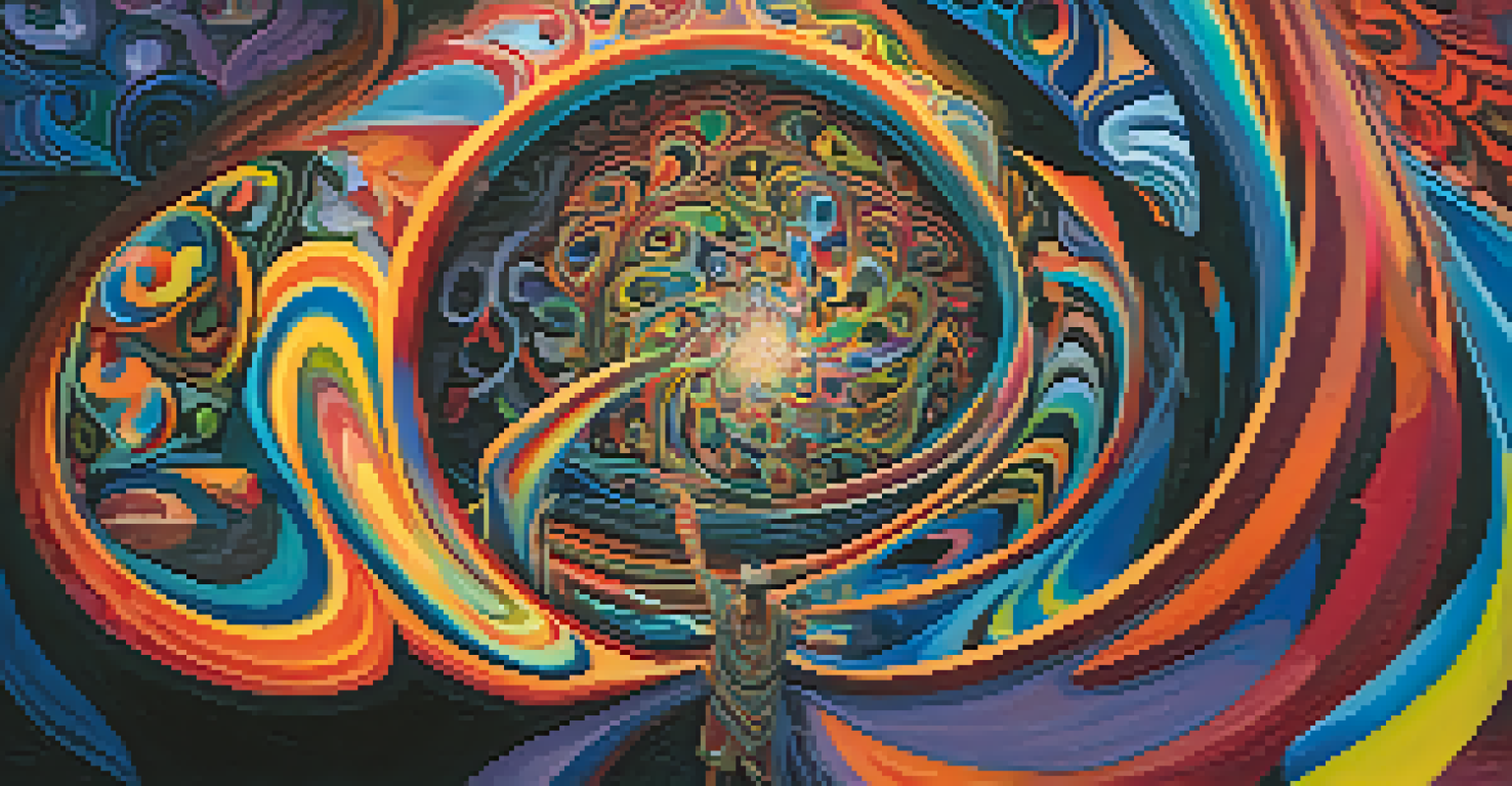Ayahuasca vs. Traditional Therapies for Addiction

Understanding Addiction and Its Challenges
Addiction presents a complex challenge affecting both individuals and their loved ones. It often involves a cycle of dependence that can be difficult to break. Many traditional therapies aim to address the underlying psychological issues, but they may not resonate with everyone. This is where alternative approaches like Ayahuasca come into play, offering a different perspective on healing.
Addiction is a family disease. One person may use, but the whole family suffers.
Traditional therapies, such as cognitive-behavioral therapy (CBT) or 12-step programs, focus on structured methods to help individuals manage their addiction. While these methods have proven effective for many, they can sometimes feel impersonal or overly clinical. For some, the emotional connection and personal history tied to addiction may not be fully explored, leading to a sense of incompleteness in recovery.
On the other hand, Ayahuasca, a plant-based brew from the Amazon, is gaining attention for its potential in treating addiction. Users often report profound emotional and spiritual experiences that can foster deep self-reflection. This approach emphasizes the importance of personal insight, which may lead to transformative changes in one’s mindset toward addiction.
What is Ayahuasca and Its Historical Context?
Ayahuasca is a traditional Amazonian brew made from two plants: Banisteriopsis caapi and Psychotria viridis. It has been used for centuries by indigenous cultures in ceremonial settings to promote healing and spiritual insight. The psychoactive compound DMT (dimethyltryptamine) within Ayahuasca induces altered states of consciousness, allowing users to explore their inner worlds.

The rituals surrounding Ayahuasca involve guided sessions led by experienced shamans, who help participants navigate their journeys. This communal aspect can create a supportive environment that contrasts with the often solitary nature of traditional therapy. Many users report feeling a sense of connection not only with themselves but also with others in the circle, enhancing the healing experience.
Ayahuasca Offers Unique Healing
Ayahuasca provides a different, experiential approach to addiction recovery that emphasizes personal insight and emotional catharsis.
Culturally rich and steeped in tradition, Ayahuasca offers a holistic approach to healing that encompasses physical, emotional, and spiritual dimensions. This broad perspective can be particularly appealing to those who feel that conventional methods have failed them. As interest in alternative therapies grows, Ayahuasca is becoming more recognized in the wider context of addiction treatment.
How Does Ayahuasca Work for Addiction Recovery?
The effects of Ayahuasca can lead to significant emotional catharsis, often helping individuals confront past traumas and unresolved feelings. This therapeutic release can be a crucial step in breaking the cycle of addiction, as it allows users to address the root causes of their behaviors. Many find that these experiences lead to newfound clarity and motivation to change.
The wound is the place where the Light enters you.
During an Ayahuasca session, participants may experience vivid visions or deep introspection, which can help reframe their understanding of addiction. This process encourages self-compassion and acceptance, essential elements in healing. It’s often described as a journey inward, where individuals can face their fears and limitations head-on.
Unlike traditional therapies that may focus on behavior modification, Ayahuasca aims to promote a deeper understanding of oneself. This shift in perspective can lead to long-lasting changes in how one approaches addiction, fostering resilience and a renewed sense of purpose. However, it’s important to note that this method may not be suitable for everyone and should be approached with care.
Comparing Ayahuasca and Traditional Therapies
When comparing Ayahuasca and traditional therapies, one significant difference is the approach to healing. Traditional therapies often utilize structured frameworks, while Ayahuasca offers a more fluid and experiential process. This distinction can make a big difference in how individuals connect with their recovery journey.
For example, while CBT focuses on modifying negative thought patterns, Ayahuasca encourages participants to confront their emotions directly, often leading to breakthroughs that traditional methods might not facilitate. The communal and ceremonial aspects of Ayahuasca can also provide a sense of belonging that is sometimes lacking in conventional therapy settings.
Traditional Therapy vs. Ayahuasca
While traditional therapies focus on structured methods, Ayahuasca encourages direct emotional confrontation and communal support.
Ultimately, the choice between Ayahuasca and traditional therapies may come down to personal preference and individual needs. Some may find the structured support of traditional therapies beneficial, while others may resonate more with the immersive experience that Ayahuasca provides. Understanding these differences can empower individuals to make informed choices about their recovery paths.
Potential Risks and Considerations of Ayahuasca
While Ayahuasca presents exciting possibilities for addiction recovery, it is essential to acknowledge the potential risks involved. The intense emotional experiences can sometimes be overwhelming, leading to anxiety or discomfort during sessions. For individuals with certain mental health conditions, such as schizophrenia, Ayahuasca may not be a safe option.
Furthermore, the setting in which Ayahuasca is consumed is crucial; a supportive, well-guided environment is necessary for a positive experience. Unfortunately, not all facilitators adhere to ethical practices, which can lead to unsafe situations. It’s vital for individuals considering this route to do thorough research and ensure they are participating in reputable ceremonies.
Lastly, Ayahuasca should not be seen as a standalone solution. While it may offer transformative experiences, it can be most effective when combined with ongoing support such as counseling or community-based recovery programs. Balancing these approaches can create a more rounded recovery strategy.
Real Stories: Successes and Challenges
Many individuals have shared their transformative experiences with Ayahuasca, often highlighting how it helped them confront deep-seated issues related to their addictions. For example, one participant reported that after a series of sessions, they were able to understand the emotional triggers behind their substance use, leading to healthier coping strategies. These personal narratives add a layer of authenticity to the discussion around Ayahuasca as a therapeutic option.
However, not all experiences are positive, and there are stories of individuals who found Ayahuasca challenging or even unhelpful. Some felt that the intense emotional journeys brought up feelings they weren't ready to handle, leading to a temporary increase in anxiety or confusion. These mixed outcomes underscore the importance of approaching Ayahuasca with realistic expectations and an open mind.
Risks of Ayahuasca Must Be Considered
Though Ayahuasca can be transformative, it carries potential risks, particularly for individuals with certain mental health conditions.
Ultimately, these stories remind us that recovery is a deeply personal journey. What works for one person may not work for another, and the balance between traditional therapies and alternative approaches like Ayahuasca will vary from individual to individual. Sharing these experiences contributes to a broader understanding of addiction recovery.
Finding the Right Path for You
Choosing the right approach for addiction recovery is a deeply personal decision. It’s essential to consider your values, beliefs, and past experiences when exploring options like Ayahuasca or traditional therapies. Some may feel more comfortable with structured therapy, while others may be drawn to the spiritual aspects of Ayahuasca.
It can be beneficial to consult with healthcare professionals who are knowledgeable about both traditional and alternative therapies. They can provide guidance tailored to your unique situation, helping you weigh the pros and cons of each approach. Engaging in discussions with others who have gone through similar experiences can also provide valuable insights.

Ultimately, the goal is to find a path that resonates with you and supports your recovery journey. Whether it’s the structured support of traditional therapy or the transformative experiences offered by Ayahuasca, what matters most is finding a method that empowers you to heal and thrive.